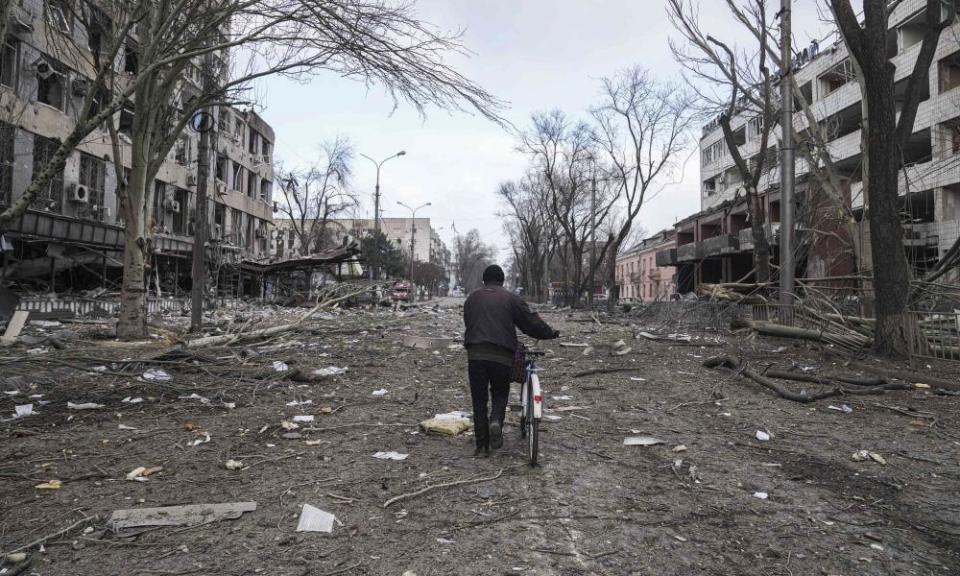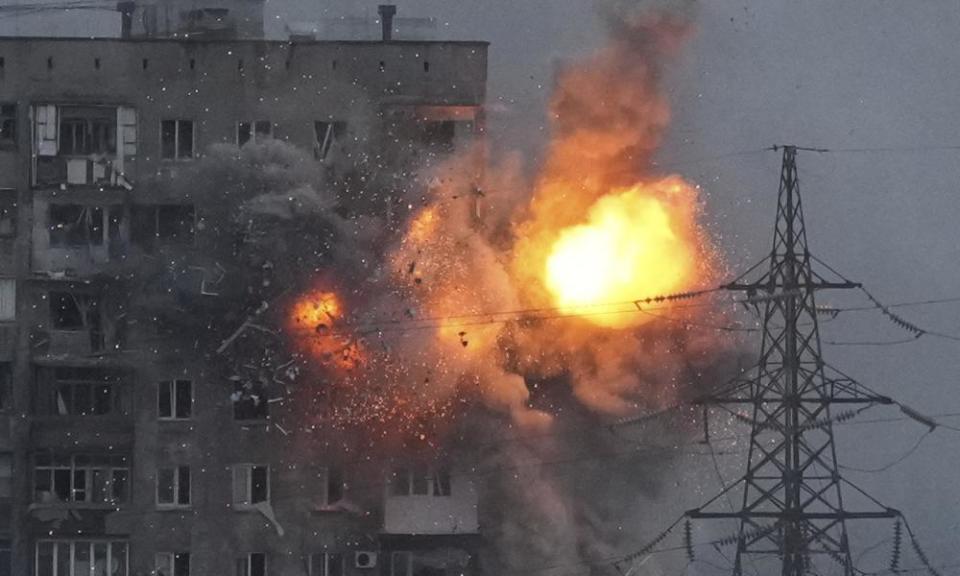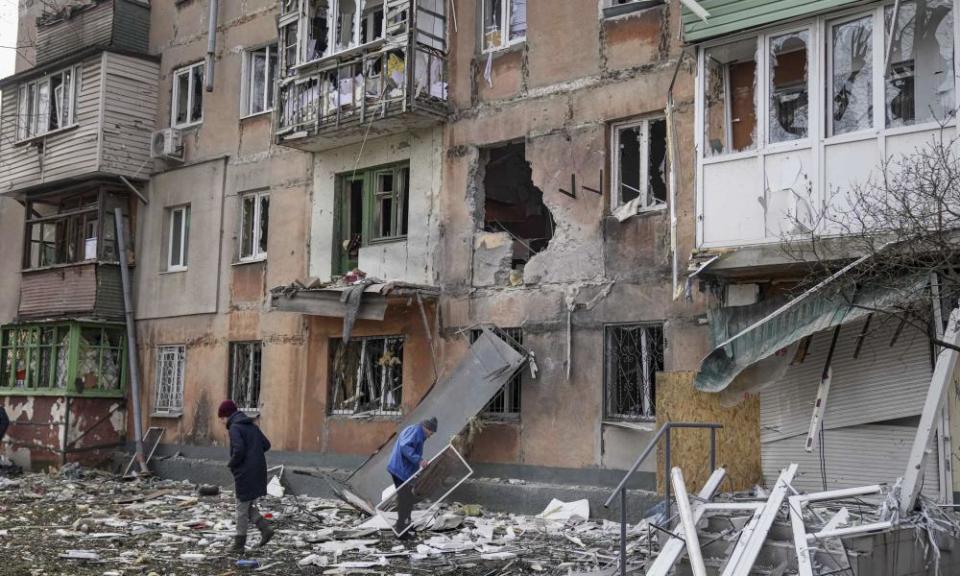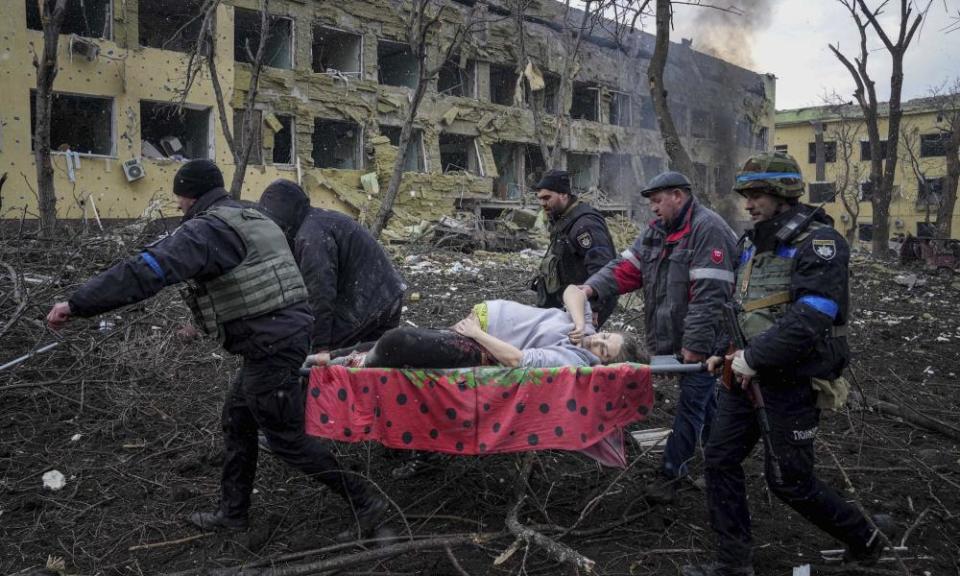Filtration and forced deportation: Mariupol survivors on the lasting terrors of Russia’s assault

On the final day of March, soldiers of the so-called Donetsk People’s Republic entered the basement in Mariupol where Svitlana and Vitaly were sheltering.
“You have 15 minutes to get ready and then you’re leaving,” shouted one, waving an automatic rifle.
It was, according to the Russian narrative of its Ukraine invasion, the day that Svitlana and Vitaly were liberated. But it did not feel much like that to them.
Instead, it was merely the end of one ordeal and the start of another: a wearying and humiliating journey through so-called “filtration” procedures, followed by forced deportation to Russia.

The siege, destruction and ultimate Russian conquest of Mariupol have been well-documented, but Svitlana and Vitaly’s experiences provide a particularly vivid illustration of the unexpected terror that was visited on this city of half a million people over the past months.
Until late February, the couple lived in a compact but cosy one-room apartment on the eastern side of Mariupol, with Svitlana’s two children from a previous marriage. She worked in a school, he had a factory job. She was three months pregnant and the couple were looking forward to their first child together.
Over the next two months, they lost almost everything.
‘I thought I’d lost him forever’
They had not paid much attention to the warnings that Russia could launch a new war in Ukraine, but they could see and hear the first incoming fire on 24 February from their windows.
It soon became clear that it was too dangerous to stay sleeping in the apartment, but their block’s cellar was not fit for habitation, so instead most residents moved to the stairwell, laying out makeshift mattresses on the hard concrete floors.
Gradually, they settled into a routine. In the first days, there were lulls in the shelling and they could scurry outside to buy food. They bought two chickens from an acquaintance with a garden; with someone else, they swapped a bottle of vodka for some potatoes.

They cooked over open fire in the courtyard, though at times even that seemed too dangerous, as the artillery shells flew in with increasing frequency. Once every two days, Vitaly would risk his life to venture out to a well and bring water for the family. Some days, he took Svitlana’s 13-year-old son with him, so they could carry more water back. In the night, it was sometimes so cold in the stairwell that the bottles of water turned to ice.
One day, when Vitaly began to lower the bucket into the well, he saw there were dead bodies floating far down below. He assumed they had jumped in to take cover during unexpected shelling, but had then fallen and drowned. He set off to find another well, with clean water.
On one water run, a shell landed so close to Vitaly that he was thrown to the ground by the blast. “He came back home with these crazy eyes, he was making no sense, I thought I’d lost him forever,” said Svitlana. The next day, his cognitive function was better, but he lost hearing in his right ear for the next two months.
How many people in their building were killed? Vitaly counted, slowly: “One, two, three, four, five, six, seven, eight. Eight people we knew personally, just from our section of the block. And in the neighbouring block it was much, much worse,” he said.
From the blown-out windows of the upper floors of their building, they could see plumes of smoke rising across Mariupol. Svitlana wondered about her parents on the other side of town. She had no idea if they were still alive, and no way of finding out. There was no electricity and no phone reception.
‘When will it end?’
On days when there were deaths, a group of men from the block buried the bodies in the courtyard, working as quickly as possible to minimise the time spent outside. It was the old people who died first.
“I knew those old women all my life. They sat outside the apartment block on the benches, chatting away, passing the time. And then you have to close the eyes of those women and bury them in their own courtyard,” said Vitaly.

Five times, Grad missiles hit their apartment block, as Russian forces haphazardly attempted to target detachments of Ukrainian forces that had based themselves nearby. Vitaly and Svitlana’s flat caught fire after one of the strikes. By the time the flames died down, everything had been destroyed; even the wall between the kitchen and the living room had been incinerated.
The cold nights, the lack of food and the constant bombardment were hard to stand. Svitlana’s daughter had bouts of hysteria and screaming. An old man on one floor kept asking the same question: “When will it end?” On another floor, a woman refused food. It would be better to end things sooner, she said quietly.
On 17 March, after another rocket attack, Svitlana lost her pregnancy. She was bleeding heavily and feverish, but there was no chance to receive proper medical care. On the third day, one of the neighbours managed to find an ampoule of Oxytocin; Svitlana injected it herself and blood started flowing more freely.
“I’m not 15, I know how these things work,” she said, when asked how she knew how to inject the medicine. It may have saved her life.
After the miscarriage, the neighbours rallied around Svitlana with the few provisions they had left. Someone rustled up some vitamin pills. Someone else found a miraculously uneaten piece of cheese. She continued to bleed periodically, but felt as if she might survive.
One morning, a part of the apartment block was hit by an airstrike, causing the entire building to shake and debris to fall from the ceiling and walls. As they regained composure, they could hear wailing from the ninth floor, where a woman had remained, living with her 11-year-old son throughout the bombardment.
Vitaly rushed upstairs. He could see the boy’s arms and legs sticking out from under a pile of bricks and debris. He worked him free. The boy was shocked, but unhurt. His mother was dead.
They were not able to bury her in the courtyard like the others; she had not been a slim woman, and it was too much to carry her down from the ninth floor. So they left her under the rubble.
Afterwards, the boy displayed few emotions. He did not cry. He politely said thank you when someone gave him food, or a hug. But then, in the nights, he would let out terrible piercing screams amid his fitful bursts of sleep.
Soon after the airstrike, the family moved to the basement of a neighbouring house, where another group of people were already sheltering. They took the boy with them.
‘Filtration’
After a week living in the cellar, with only the briefest forays above ground during which the shelling seemed to have intensified further, the Russia-backed forces arrived on 31 March and ordered everyone out of the cellar.
When the group emerged above ground, they were ordered to walk for half an hour, carrying their possessions with them and with shells flying overhead, to a spot where they joined others from the district. Women and children were crammed into buses while the men continued on foot.
In the village of Sartana, Vitaly and some other men were put into the back of a truck that reeked of corpses. Nobody explained anything about where they were going or what would happen next.
Svitlana and Vitaly were reunited in the town of Novoazovsk, part of the Russian proxy Donetsk People’s Republic, where they were housed in a school, 20 people to a classroom. There was nothing to sleep on, but they were given hot food. Soldiers confiscated their phones.
They left the boy whose mother had died in Novoazovsk; his estranged Russian father would come to pick him up, they hoped. His father would take him to live in Russia, the country whose assault had killed his mother.
After some days, Svitlana, Vitaly and the two children were again loaded on to buses, and driven to the town of Dokuchayevsk, where they joined hundreds of people waiting in the local Soviet-era House of Culture to undergo what the Russians have termed a “filtration” procedure.
Svitlana was allowed into the mothers and children room; Vitaly was held in the main hall, where hundreds of men tried to grab a few hours sleep slumped on chairs. The smell was disgusting.
The mothers and children room was hardly any better. Many of the children had diarrhoea or dysentery; Svitlana’s daughter was vomiting frequently. She herself still felt weak. There was almost no food: breakfast was tea, lunch was hot water and a biscuit.

After two days, it was Vitaly’s turn for filtration. He was taken to the police station, where he was ordered to undress fully and examined for tattoos that might give away a Ukrainian nationalist affiliation. Then he was questioned, photographed and fingerprinted. The process took five hours. After that, the family were put on a bus to the border with Russia. They crossed after another round of questioning, and spent the night at a camp on the other side, from where the next morning yet another bus drove them to the train station in the city of Taganrog.
In the filtration camps, Mariupol residents had been told they would be given resources to start a new life anywhere they wanted in the Russian Federation. But when they arrived at the station in Taganrog, there was one train, departing to Saransk, a dusty city 300 miles east of Moscow.
For those who did not have their own travel plans, Saransk was the only option. Exhausted, weary and unwashed, they boarded the train to an uncertain new life.
‘Return to what?’
Svitlana had found a better option. She had managed to contact a friend who had an acquaintance in Taganrog, who agreed to put the family up for three days. For the first time in two months, Svitlana and Vitaly slept in real beds and had hot showers.
They told their host in Taganrog a little about what they had been through, and the woman was incredulous. But they did not go into detail.
“We didn’t want to say too much about what we had seen while we were still in Russia; we didn’t want to attract attention, we wanted to be able to leave,” said Svitlana.
She was still regularly bleeding from the miscarriage. Some of her skin had attained a blueish hue, and her legs were swollen “like a bear”, she said. On occasion, she fainted. But she did not seek medical treatment. Spending time inside Russia after the weeks of misery they had been through felt like further abuse, and she wanted to get out as soon as possible.
From Taganrog, the family took a train to Moscow, then to St Petersburg. From there, they crossed to Estonia without problems, and made their way onwards to a western European country, where they are now trying to make a new home.
Soon after their arrival, doctors performed an operation on Svitlana that she should have had weeks earlier. Slowly, her life is getting back to normal. The children have calmed down a little. The aches and pains have dissipated and the swelling in her legs has subsided. She no longer jumps in fear every time someone opens or closes a door, and she can recount the awful ordeal she went through with clarity and poise.
But the nights are harder than the days. Almost every night, Svitlana has visions of incoming artillery and missiles. She wakes up breathless and terrified.
Many of the couple’s friends have simply disappeared. Are they still in Mariupol? Trying to start a new life after being dumped somewhere in a far-flung corner of Russia? Dead? They have no idea.
Svitlana does know that her parents survived the siege of Mariupol. She has not spoken to them since the beginning of the war, and they do not currently have working phones. But twice, they called Svitlana’s sister from a borrowed phone, to give notice they were still alive.
Svitlana has no more information than that; she does not know what horrors they went through in their part of the city, though she can guess it was not easy. It was not easy for anyone in Mariupol.
Svitlana and Vitaly are pseudonyms. They asked not to use their real names, or give their address in Mariupol, because they fear for Svitlana’s parents. She hopes that soon, they too will be able to leave for Europe; she knows her father would not want to live under Russian rule, she said. The fate of her parents is a constant worry that prevents her focusing fully on starting a new life in Europe.
One thing Vitaly and Svitlana are both certain of is that they will never go back.
“Return to what?” asked Vitaly, bitterly. “There’s nothing there. Nothing. It’s over. Mariupol is over.”

 Yahoo Movies
Yahoo Movies 